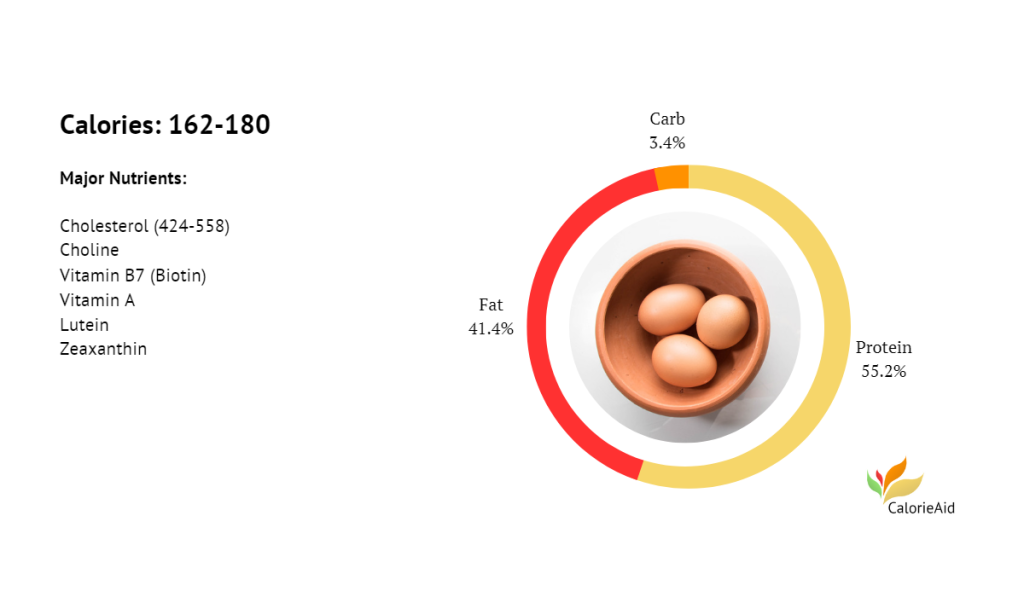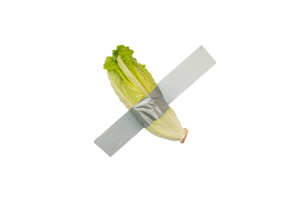Eggs are one of the most versatile ingredients in the kitchen. Not only are they consistent in our breakfast, but they’re always present in other foods that we repeatedly eat. Eggs are in pasta, cake, meatballs, and many other foods that you wouldn’t expect. That’s why studying egg nutrition has more depth than you think, and it impacts many other food choices as well. For the last 3 years, I regularly had 3 eggs daily as a part of my diet as I was building my body at the gym. It was either that or 75 grams of low-fat cheddar cheese. Fast forward to today, I succeeded in accomplishing my body goals and developing a better lifestyle. In this article, I will discuss 3 eggs calories, macronutrients, overall nutrition, and some healthy recipe to avoid being repetitive with diet, Let’s begin.
3 eggs contain 162-180 kcal depending on the size of the eggs. They contain 14.4-18 grams of protein, 10.8-14.4 grams of fat, and 0.9-1.2 grams of carbs. Eggs are rich in cholesterol and have about 424-558 micrograms, and contain several other essential nutrients such as choline, vitamin B7, vitamin A, Lutein, and Zeaxanthin.

Table of Contents
Eating 3 Eggs A day For 5 Years
I first started eating 3 eggs every day back in 2017. I was planning on losing fat and gaining muscle, and I wanted to diversify my protein sources and eat less chicken and meat. 15 grams of protein from 3 eggs for their calories seemed right for me, so I added 3 eggs to my daily diet. I also wanted to increase my cholesterol intake because although I wanted to lose weight, I also wanted to build more muscles. As for compliance, I sometimes substitute some of the eggs for 25 grams of cheddar cheese each. There are days when I substitute one or two, and there are days when I substitute all three.
As a result, I was really getting major muscle gains in the long run. After a few months, I started to see results. In short, due to my total diet (and not just the eggs), I went from 65 kg to 75 kg in lean body mass (i.e. I gained 10 kg of muscle). This is obviously like everyone, but if you’re in the same situation as me, you’ll see some good results.
3 Eggs Benefits
Eggs are an important source of many nutrients. Each and every one of these nutrients has its own unique benefits. We will explore them one by one.
Cholesterol
One of the main fats in our body, cholesterol has many functions that include:
- Building the cell membranes
- Producing sex hormones like testosterone and estrogen
- Producing bile acid that plays an important role in digestion
- Helping in the production of vitamin D.
However, eating 3 eggs every day will give you too much cholesterol that comes with some harm, regardless of these 3 eggs calories. We will talk about that later in more detail.
Proteins
Proteins are essentially one of the most important building blocks of our body, and it is found everywhere. It is found in every tissue like hair, muscle, skin, and bones. It makes up the enzymes in our bodies that carry out many important biochemical reactions. 3 eggs contain 15-18 grams of protein which constitute around 8-10% of an average person’s diet.
Choline
Eggs are one of the few foods that contain choline. Your body can produce small amounts of choline in your liver but it is not enough to satisfy your daily needs. Your body converts choline to acetylcholine which is an important neurotransmitter that affects your muscle strength and brain function. There’s not enough data to establish how much of an intake your body needs of choline.
Vitamin B7 (Biotin)
Although biotin deficiency is rare, it is an important micronutrient. Biotin plays a major role in most macronutrient metabolism and is responsible for the regulation of cell signals and the activity of genes. Certain bacteria can also produce biotin in your digestive system.
Vitamin A
Vitamin A is mostly famous for promoting eye health, but it has other functions as well. It plays an important role in your immunity, bone health, and much more. The recommended daily amounts of vitamin A are 900 micrograms (3000 IU) for men and 700 mcg (2330 IU) for women.
Antioxidants Lutein and Zeaxanthin
Antioxidants in general defend your body against free radicals. Free radicals can cause aging and many other diseases like heart disease, cancer, diabetes, and Alzheimer’s disease.
I hope this goes beyond 3 eggs calories. Nutrition is always deeper than you think and many elements are involved in keeping you healthy.
Eating 3 Eggs is not just about Calories
Egg whites contain mainly protein, which is not harmful to your body in any way. On the other hand, the yolk contains around 200 mg of cholesterol. Beyond calories, 3 eggs contain 600 mg of cholesterol. Too much cholesterol in your diet has been linked to increased chronic heart disease and other diseases, although the American dietary guidelines removed the limitation of 300 mg cholesterol per day in 2015. It is not fair to look at a single diet ingredient without considering the diet as a whole. If you eat other foods that are high in cholesterol and/or you have other factors that put you at risk (sedentary lifestyle, smoking,…etc.) then you should probably eat fewer eggs. However, if you’re constantly going to the gym, building muscles, eating fiber-rich foods, and have moderate cholesterol consumption in your diet then you’re good.
That’s the main argument against eggs. You can still find other stuff online, However, I checked all of them. None of them seem to have strong scientific evidence. Here at CalorieAid, we believe in moderation. Eating too much of one thing can cause your diet to be imbalanced and can lead to health problems. Check out our article on how to identify healthy and unhealthy foods.
Low Calories 3 Eggs Recipes
Because eggs are the most versatile ingredient, there are many healthy ways to cook 3 eggs. It doesn’t have to be monotonous and repetitive every time. Here are some of these ways:
- Hard-boiled. Probably the healthiest way to cook an egg, but you don’t have to eat it the way it is. You can easily chop these eggs up into an egg salad or take out the yolk and add stuff to it to turn it into deviled eggs. They’re also a great topping for a hearty bowl of ramen.
- 3 eggs Omlete. A classic omelet is an excellent way to enjoy your eggs, but you have more options than you think. Incorporating herbs or mushrooms into the omelet can give you an added flavor without increasing your calories. You can also try other styles of omelet like Italian frittata and Spanish tortilla. Also, you can serve the omelet with different sides of healthy veggies like tomato and steamed broccoli.
- Sunny side up. Are amazing on toast with some veggies, avocados, and some sauces like sriracha and pesto. Also, you don’t have can also crack eggs into an empty pan. Sunny side-up eggs are wonderful on top of a spiced-up tomato sauce (shakshuka) and spinach with white bechamel sauce.
- Poached. Also great on toast, and can be used in salads and sandwiches like egg benedict.
At last, we can’t forget about how eggs are used in many other dishes as an ingredient, especially in a bakery. Eggs are stable in the kitchen, and removing them from food will alter its flavor a lot.
Conclusion
To sum it up, Incorporating 3 eggs into your daily diet can be a good thing or a bad thing. The outcome depends on your activity level, fitness goal, and your diet as a whole. It can be beneficial to you if you’re trying to build muscles, but not so good if you have a lot of other cholesterol-containing foods and little fiber in your diet. Now I want to hear from you, do you love eggs? Do you have a story about incorporating your eggs into your diet with clear results? Let me know in the comments and share this article with someone who can’t figure out if they can fit eggs on their diet.


